AN EYE-OPENING EXAMINATION OF LATIN AMERICAS ROLE AS PROVING GROUND FOR U.S. IMPERIAL STRATEGIES AND TACTICS
IN RECENT YEARS, ONE BOOK AFTER ANOTHER HAS sought to take the measure of the Bush administrations aggressive foreign policy. In their search for precedents, these books invoke the Roman and British empires and draw lessons from postwar reconstructions of Germany and Japan. Yet they consistently ignore the one place where the United States has had its most intimate imperial experience: Latin America.
An original and brilliant excavation of a long-obscured history, Empires Workshop is the first book to show how Latin America has functioned as an indispensable laboratory for Americas rise to world power. Historian Greg Grandin follows the United Statess imperial operations, from Thomas Jeffersons aspirations for an empire of liberty that would govern Cuba and Spanish Florida to Franklin Delano Roosevelts Good Neighbor Policy, which taught the U.S. how to use soft power more effectively and provided a blueprint for its postwar European and Asian empire by invitation.
Empires Workshop is also the first book to examine how a preemptive foreign policy in Latin America, which included sponsoring coups, death-squad states, and paramilitary insurgencies, has transformed Americas domestic politics, forging todays ruling coalition of neoconservatives, Christian evangelicals, free marketeers, and nationalists. The road to war in Iraq, Grandin provocatively argues, can be traced back to the 1970s and 1980s, when an increasingly internationalist New Right turned to Latin America to avenge Vietnam, and in so doing rehabilitated militarism as a legitimate instrument of state and made free-market capitalism the moral core of American purpose abroad.
Today, much of Latin America is in open rebellion against American domination. Grandin concludes with a sobering analysis of these explosive tensions and poses a vital question: If Washington has been unable to bring prosperity, stability, and democracy to Latin Americaits own backyard workshop;what are the chances it will do so for the world?
ALSO BY GREG GRANDIN
The Last Colonial Massacre:
Latin America in the Cold War
The Blood of Guatemala:
A History of Race and Nation
Empires Workshop
Empires Workshop
LATIN AMERICA, THE UNITED STATES, AND
THE RISE OF THE NEW IMPERIALISM
Greg Grandin


METROPOLITAN BOOKS
HENRY HOLT AND COMPANY, LLC
PUBLISHERS SINCE 1866
175 FIFTH AVENUE
NEW YORK, NEW YORK 10010
WWW.HENRYHOLT.COM
METROPOLITAN BOOKS AND  ARE REGISTERED TRADEMARKS
ARE REGISTERED TRADEMARKS
OF HENRY HOLT AND COMPANY, LLC .
COPYRIGHT 2006 BY GREG GRANDIN
ALL RIGHTS RESERVED.
DISTRIBUTED IN CANADA BY H. B. FENN AND COMPANY LTD.
LIBRARY OF CONGRESS CATALOGING-IN-PUBLICATION DATA
Grandin, Greg, date.
Empires workshop: Latin America, the United States, and the rise of the new imperialism / Greg Grandin.
p. cm.
Includes index.
ISBN-13 : 978-0-8050-7738-4
ISBN-10: 0-8050-7738-3
1. Latin AmericaRelationsUnited States. 2. United StatesRelationsLatin America. 3. AmericansLatin AmericaHistory. 4. United StatesForeign relations2001Philosophy. 5. Imperialism. I. Title.
F1418.G66 2006
325.320973dc22 2005056125
HENRY HOLT BOOKS ARE AVAILABLE FOR SPECIAL PROMOTIONS AND PREMIUMS.
FOR DETAILS CONTACT: DIRECTOR, SPECIAL MARKETS.
FIRST EDITION 2006
DESIGNED BY MERYL SUSSMAN LEVAVI
PRINTE D IN THE UNITED STATES OF AMERICA
3 5 7 9 10 8 6 4 2
For Manu
I kept my workshop of filthy creation: my eyeballs were starting from their sockets in attending to the details of my employment. The dissecting room and the slaughterhouse furnished many of my materials; and often did my human nature turn with loathing from my occupation, whilst, still urged on by an eagerness which perpetually increased, I brought my work near to a conclusion.
MARY SHELLEY, Frankenstein
Contents
INTRODUCTION
The Camel Not in the Koran
CHAPTER ONE
How Latin America Saved
the United States from Itself
CHAPTER TWO
The Most Important Place in the World:
Toward a New Imperialism
CHAPTER THREE
Going Primitive:
The Violence of the New Imperialism
CHAPTER FOUR
Bringing It All Back Home:
The Politics of the New Imperialism
CHAPTER FIVE
The Third Conquest of Latin America:
The Economics of the New Imperialism
CHAPTER SIX
Globalizations Showpiece:
The Failure of the New Imperialism
CONCLUSION
Iraq Is Not Arabic for Latin America
Empires Workshop
INTRODUCTION
The Camel Not in the Koran
THE ARGENTINE WRITER Jorge Luis Borges once remarked that the lack of camels in the Koran proves its Middle Eastern provenance: only a native author, he explained, could have so taken the animal for granted as not to mention it. Perhaps a similar familiarity explains the absence of Latin America in recent discussions about the United States and its empire. Though Latin America has played an indispensable role in the rise of the United States to global power, it elicits little curiosity from its neighbor to the north. Latin America doesnt matter, Richard Nixon advised a young Donald Rumsfeld, who was casting about for career opportunities. Long as weve been in it, people dont give one damn about Latin America.
Were it not for Borgess insight, this studied indifference to Latin America would seem ironic, for the region has long served as a workshop of empire, the place where the United States elaborated tactics of extraterritorial administration and acquired its conception of itself as an empire like no other before it. The Western Hemisphere was to be the staging ground for a new empire for liberty, a phrase used by Thomas Jefferson specifically in reference to Spanish Florida and Cuba. Unlike European empires, ours was supposed to entail a concert of equal, sovereign democratic American republics, with shared interests and values, led but not dominated by the United Statesa conception of empire that remains Washingtons guiding vision.
The same direction of influence is evident in any number of examples. The United Statess engagement with the developing world after World War II, for instance, is often viewed as an extension of its postwar policies in Europe and Japan, yet that view has it exactly backwards. Washingtons first attempts, in fact, to restructure another countrys economy took place in the developing worldin Mexico in the years after the American Civil War and in Cuba following the Spanish-American War. We should do for Europe on a large scale, remarked the U.S. ambassador to England in 1914, essentially what we did for Cuba on a small scale and thereby usher in a new era of human history. Likewise, most discussions of George W. Bushs foreign policy focus on the supposed innovation of a small group of neoconservative intellectuals in asserting the right to unilateral preemptive military action both to defend national security and to advance American ideals. But neither the neocons dire view of a crisis-ridden world that justifies the use of unilateral and brutal American military power nor their utopian vision of the same world made whole and happy by that power is new. Both have been fully in operation in Washingtons approach to Latin America for over a century. The history of the United States in Latin America is cluttered with preemptive interventions that even the most stalwart champions of U.S. hegemony have trouble defending.

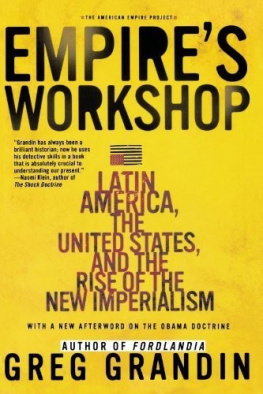

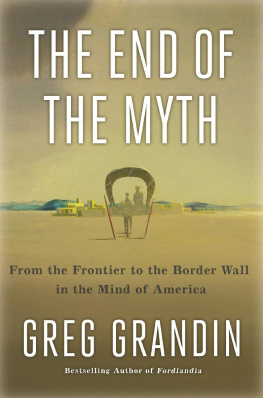
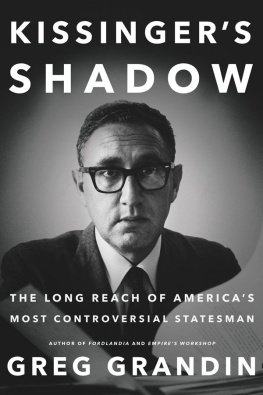

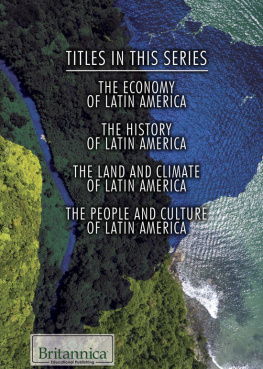
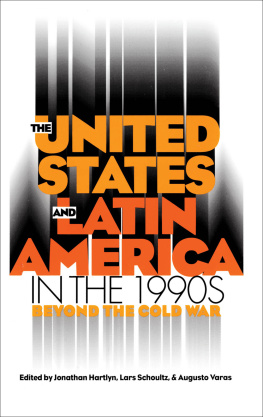
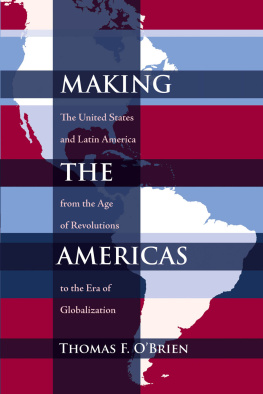
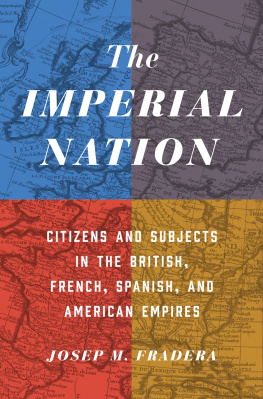
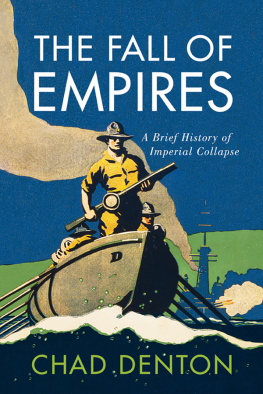
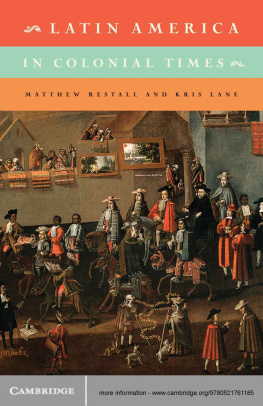
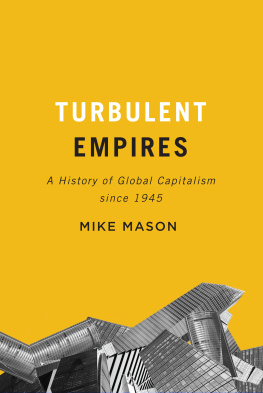
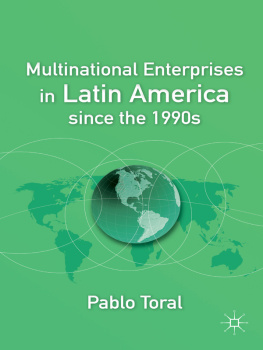


 ARE REGISTERED TRADEMARKS
ARE REGISTERED TRADEMARKS